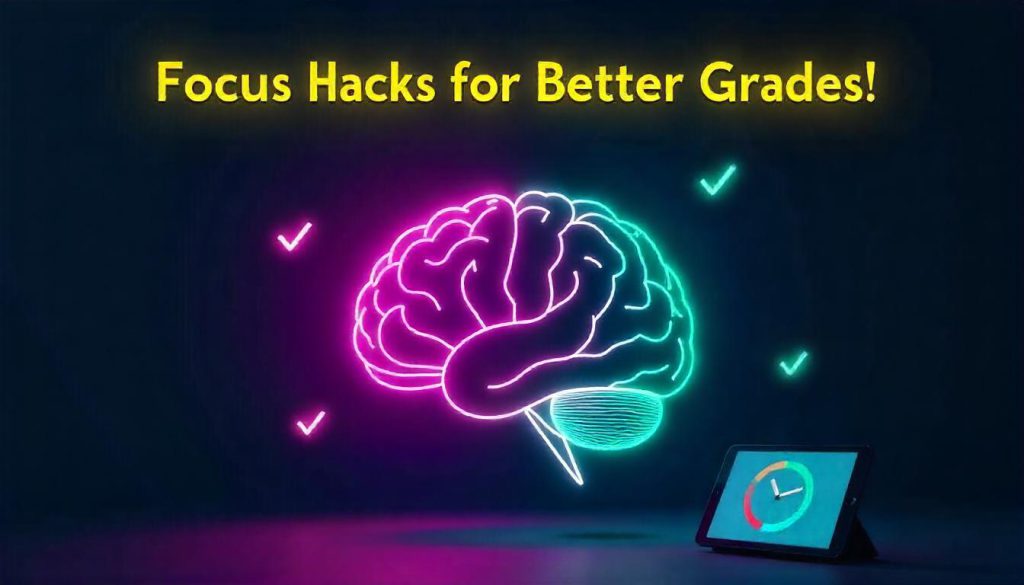This level of efficiency might feel utterly out of reach for some students, but with one strategy—focus, uninterrupted study sessions— it is entirely possible. This article examines the work of Han, a Columbia University graduate who mastered block off work periods, to explore how one can study smarter, not harder, by diving into long, distraction-free blocks of work. If you’re balancing classes with an internship or extracurricular activities, these strategies will enable you to reclaim time and improve your grades. Prepared to make each study session worthwhile? Let’s uncover how to gain hours of free time in your day.
Recharge Your Brain Before You Start
Studying requires focus, and like a phone, your brain needs to be charged to help you concentrate during studying. Every day, we are all bestowed with a certain number of cognitive functions to utilize, and Han refers to it as “brain juice.” To fully utilize your focus, target the time window when you are the freshest (morning if possible). Avoid the temptation of checking your phone as notifications are a focus sipper. In case mornings are not convenient, reset by taking a quick or short walk before diving into the work. Prioritizing rest helps in approaching work with poise and energy, setting the tone for the productive session. Before working on studies, ask yourself, do I give my brain a chance to recharge?
Set a Clear Goal and Plan
Do you recall the last time you sat down to study but ended up wasting time trying to figure your way out? Han’s technique is highly effective: ensure you always have a plan. Passes do not require lengthy outlining; just figure out steps for every session. For a 3- or 4-hour block, make a “do” list which incorporates “read chapter 3”, “essay outline”, and “solve 10 practice problems.” A decided plan enables concentration on execution rather than planning, and also helps lift the burden of decision fatigue.
Think about it in the context of cooking: You have a step-by-step guide to follow rather than searching for ingredients. Following your outline saves you the mental preoccupation of figuring things out off the top of your head. How about trying to work on fulfilling one task for the upcoming study session.
Change Your Study Environment
There is no doubt that your bedroom is a cozy setting. A study setting? Not so much. Han prefers to do her studying outside of the house and cites libraries and coffee shops as personal favorites. Relaxing surroundings help bring a fresh perspective, while a room that we sleep or spend time scrolling in makes staying focused difficult. Additionally, putting in the effort to reach the area serves as a motivator and also saves you from wasting time. For students that own tablets like the iPad, accessorizing them with Paper like screen protectors greatly improves markup note-taking, through feeling as if you are actively writing, therefore improving concentration in any surrounding. Where do you imagine going that would allow for a complete focus for marking assignments?
You do not Remember Everything
Studying naturally makes you think and opens up avenues that you otherwise wouldn’t have considered such as “Did I respond to that message?” and “I should get some groceries”. These thoughts can be overly distracting.
Han’s solution? Jot down anything that crosses your mind on a sticky note. By assuring yourself you’ll handle it later, you mentally relieve yourself while keeping your focus. It is a known fact that an individual takes around 25 minutes to get back on track after being interrupted. This little habit can save you a lot more than what you think. It’s almost as if you’re storing your troubles in a parking lot. You’re able to step out but only after your session ends. How many times have you let a single thought distract you from studying?

Divide tasks to eliminate multitasking.
Not all study-related tasks are the same. Han noted that an essay that includes ‘randomness’ in it as an example, will combine focused work such as writing will end as a distraction. To avoid doing this, divide your session into blocks. One for research where you can allow yourself to explore using Google freely. The next block is for execution which involves writing or solving problems. If anything, turn off Wi-Fi during execution time and make a note for during your research in the future. This type of restriction keeps the brain away from effortful thinking as you struggle to balance many modes, helping you complete the various tasks more effectively. For instance, don’t leap straight into homework after watching a lecture on YouTube. Make time for everything instead.
What tasks do you think you could compartmentalize for your next study session?
Remove Digital Distractions
Digital distractions often interfere with our focus, including cellular devices. In the case of han, he alleviates phone-related distractions by simply putting the phone away. Avoiding phone-related distractions can be as simple as turning off notifications, placing the phone out of reach, or even enabling apps to prevent access to social media platforms for the desired duration. If that method is considered extreme, one can notify friends or family through messages informing them about being offline for a couple of users. This method helps calm the anxiety regarding missing notifications and sets defined limits. To study effectively at the library, Han left her phone at the dorm with the intention of forcing herself to stay in the moment. For later, guilt-free phone time, this sacrifice is small. Consider your upcoming study session. What is the singular distraction you would choose to do without?
Chunking Strategy
Studying for a continuous four-hour period seems tough, however, the aforementioned strategy can be helpful. When han is faced with overwhelming study sessions, he breaks it down into smaller, effectively more manageable increments. Work towards one productive hour rather than the full session. Aim to work towards one hour and celebrate achievement. The “time block” technique has been psychologically proven to build momentum as well as aid to create a sense of “manageability.” Motivation is further heightened with every completed task as it creates a step towards the freedom that comes after the day’s work is done.
Key Takeaways
- Recharge Your Brain: Start with a fresh mind by avoiding your phone or taking a short rest before studying.
- Plan Ahead: Create a clear to-do list to stay focused and avoid decision fatigue.
- Change Your Space: Study in a new environment to signal focus and minimize distractions.
- Jot Down Thoughts: Use a sticky note to capture random ideas and keep your mind clear.
- Separate Tasks: Divide research and execution to maintain focus and efficiency.
- Ditch Your Phone: Eliminate digital distractions to stay in the zone.
- Chunk Your Time: Break long sessions into 1-hour blocks to build momentum.
Conclusion
Mastering focused study sessions isn’t about locking yourself in a room for hours—it’s about working smarter to unlock more time for the things you love. Whether you study for 2 hours or 4, the key is to create a system that works for you. Experiment with these strategies: try a new study spot, plan your tasks, or chunk your time. Not every day will be perfect, and that’s okay. The beauty of this approach is its flexibility—you can adapt it to fit your schedule and goals. So, why not give it a shot? Start small, maybe with a 1-hour focused session, and see how it transforms your day. You’ve got this—here’s to studying smarter and living freer!
